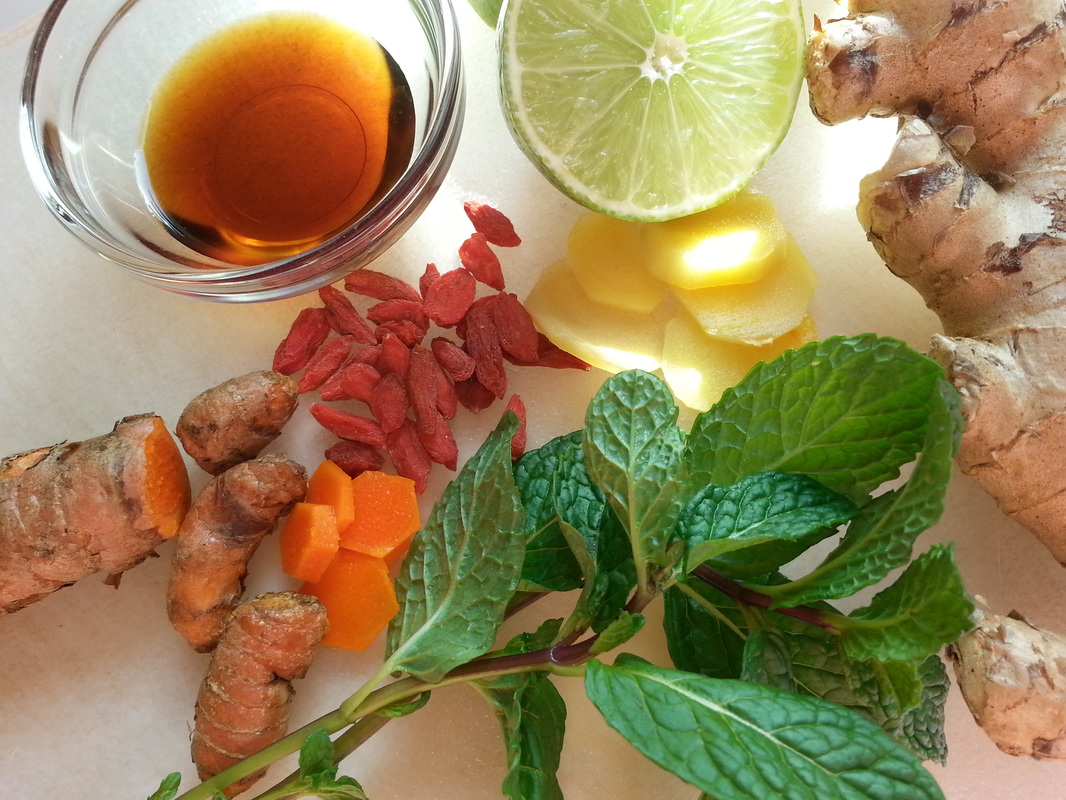- Eat lots and lots of whole plant-based foods every day, including fresh vegetables and fruits, whole grains, beans and legumes, and nuts and seeds, to get all the nutrition your body needs. Even better than lots and lots, consume a diet that consists entirely of whole plant-based foods. Plants are loaded with vitamins, minerals, antioxidants, carbohydrates (yes, carbs in whole plant-based foods are actually very good for you!), fats (good fats), phytonutrients, and even protein (plenty of protein! Scroll down to see the percentages of protein in plant-based foods). The only vitamins lacking in whole plant-based foods are vitamin B12 and vitamin D.
- Prepare fresh home-cooked meals from whole plant-based foods. That way you get to control what goes into your foods, and better yet, you get to control what does not go into your foods such as unwanted saturated fats and cholesterol from animal-based foods. There are many, many recipes available online and in cookbooks to create simple plant-based meals that are absolutely delicious and totally satisfying! For example, this Vegan Alfredo Sauce takes less time to prepare than the pasta it will go over, and you will be completely amazed by this rich and creamy sauce!
- Skip the oil, keep the fat low, and get your fat from whole plant-based foods such as walnuts and avocados. There is really no such thing as healthy oil, even olive oil. All oil is 100 percent fat and contains some level of saturated fat along with the unsaturated fats. Even olive oil has 14 percent saturated fat, which clogs arteries. An avocado, on the other hand, has less fat (77 percent), and in addition, is loaded with vitamins C, E, K, and B vitamins riboflavin (B2), niacin (B3), B6, folate (B9), and pantothenic acid (B5), as well as magnesium, phosphorous, potassium, copper, and manganese, plus fiber and protein. Likewise an ounce of walnuts has 84 percent fat and is loaded with protein, magnesium, phosphorous, copper, manganese, and fiber. Eat these foods sparingly, especially if you are trying to lose weight or have a heart condition.
- When ordering “healthy” food from a menu, don’t forget to ask how your “healthy” food will be prepared. Find out if there’s any butter, cream, cheese, or other dairy and ask that those be left out. Also ask for your food to be sautéed dry, meaning without oil or butter, or lightly steamed without adding any oil or butter. Ask to have any sauces served on the side so that you can control how much you use. Here’s something I like to do: I get my sauce on the side, and rather than pour the sauce over my food, I like to dip my food into the sauce because a little goes a long way. I often find that I get all the flavor of the sauce while leaving more than half of the sauce behind.
- Limit your sodium intake to below 2,300 mg per day. That’s slightly less than a teaspoon of salt. However, most people consume about 3,400-3,900 mg per day! If you prepare your own foods and use whole plant-based ingredients, you can easily control the amount of sodium in your foods. One way to keep track of your daily sodium intake is to start your day by measuring a teaspoon of salt into a small bowl, then sprinkling that salt into and over your food throughout the day. If you use it up, you’ve reached your limit and you’re done with sodium for the day.
Packaged foods can be very high in sodium. If you eat any packaged foods, read the nutritional label on the side or back of the package to find out the amount of sodium per serving. Then be sure to multiply that amount by the number of servings you are eating to find out exactly how much sodium you are actually consuming. For example, say you are having a snack that has two servings in a package, and you eat the entire package. You have to double the amount of sodium per serving to find out how much sodium you actually consumed. Be sure to remove 1/8 teaspoon of the salt that you measured for the day for every 300 mg of sodium you consumed from the packaged food in order to stay within the daily sodium limit. - Don’t deprive yourself of treats. Depriving yourself of a treat when you want it only makes you want it even more, and eventually you may become obsessed and over-indulge or even binge. Be smart about the treats you eat and strive for the right combination of nutrition and satisfaction. For example, an ounce of dark chocolate, which is about a quarter of a large chocolate bar, is loaded with antioxidants and quite satisfying. Or try whipping up a sweet cashew cream by placing half a cup of soaked raw cashews into a Vitamix or other blender along with a tablespoon of maple syrup, half a teaspoon of vanilla extract, and 2-4 tablespoons of water, and blend until smooth (you can increase or decrease the water to get the desired thickness, and you can add more maple syrup if you like your cream sweeter). Pour your fresh cashew cream over a bowl of your favorite berries – it’s delicious, satisfying, and healthy!
If you do feel the urge to splurge on something lethal, allow yourself to have just a little bit. Often you may find that a strange phenomenon occurs: as soon as you allow yourself to have it, you no longer want it. That happens to me all the time. - Stay hydrated. According to Michael Greger, M.D., proper hydration reduces the risk of many chronic conditions, including bladder and colon cancers, heart disease, heat stroke, falls and fractures, kidney disease, urinary tract infections, and constipation. The well-known recommendation of 8 8-ounce glasses of water per day was traced back to a 1921 paper published in the Journal of Physiology. The author measured his own daily fluid loss as urine and sweat, and estimated the loss to be ~3% of his body weight, or 8 cups. The most recent recommended water intakes by authorities from Europe, U.S. Institute of Medicine, and the World Health Organization are 8-11 cups of water per day for women and 10-15 cups of water per day for men. In addition to drinking water, we get water from other sources, including the foods we eat and the water our bodies produce. These other sources provide us with ~4 cups of water per day. Therefore the recommendation is to drink 4-7 cups of water per day for women and 6-11 cups of water per day for men.
- Get plenty of exercise. Why? Because it will improve your energy, mood, ability to burn calories, ability to lose or maintain weight, muscle tone, flexibility, digestion, blood pressure, triglycerides, blood sugar levels, and HDL (good) cholesterol, to name a few things. And it will just make you feel good. Now, I’m not talking about “no pain, no gain” exercise, unless you’re into that. Remember, the best, super-intense, high calorie- and fat-burning workout does you absolutely no good if you stop doing it. Really the best exercise you can do is any exercise you enjoy and will do on a consistent basis! That could be walking, running, dancing, jumping on a trampoline (mini or large), playing a pick-up game of basketball, soccer, baseball, or flag football, skating, swimming, paddling a kayak or canoe, lifting weights, cycling, playing hop scotch, jumping rope, going to a yoga or fitness class, or anything else that gets you moving and elevates your heart rate. According to Dean Ornish, MD, we should strive to at least walk for 30 minutes a day, 5-6 times a week, or a full hour 3 times a week. That’s it! That could be simply walking your dog! And if that sounds like too much, start with something you can do, such as walking to your mailbox and back, then slowly go a little further each time, working up to 30 minutes a day.
- Decompress to reduce stress. Stress causes your body to release excess cortisol, a stress hormone that according to Dina Aronson, M.S., R.D., increases blood sugar levels and inhibits insulin production, which increases risk of type 2 diabetes. Cortisol also places fat into visceral fat cells (those surrounding your internal organs; trouble for your health), increases appetite, and makes us crave calorie-dense foods. This, along with increases in blood sugar can lead to weight gain and obesity. Cortisol also compromises digestion and absorption of foods, causing indigestion, as well as irritation and inflammation of the mucosal lining that can lead to ulcers, irritable bowel syndrome, or colitis. Mucosal inflammation also leads to increased production of cortisol, which perpetuates the cycle. So after a stressful day at work or running the kids around, find some time for yourself to unplug from technology and do something you enjoy, including walking, hanging out with friends, practicing yoga, or whatever it is that calms and relaxes you.
- Get plenty of sleep. We all know that sleep is important, and few of us get enough, whether it’s because we don’t spend enough hours between the sheets or because we have difficulty sleeping when we are between the sheets (or both). To help you get your beauty rest, here are some healthy sleep tips recommended by the National Sleep Foundation: stick to a sleep schedule by going to bed and waking up at the same times every day, including weekends; practice a relaxing routine every night before going to bed to help you relax into a deep sleep and remain asleep throughout the night; avoid naps, especially in the afternoon; exercise daily; optimize the temperature and minimize the noise, light, and other distractions in your bedroom; sleep on a comfortable mattress with comfortable pillows; use light to manage your circadian rhythms by keeping lights bright in the morning and dim in the evening; avoid alcohol, cigarettes, and heavy meals in the evening; wind down in the evening with a calming activity such as reading for the last hour before going to bed; and if you can’t sleep, go into another room and do something relaxing until you feel tired. Click here to find out how much sleep you need.
If you like this article, please give it a “Like”. And don’t forget to sign up for the free newsletter so you can have healthy information and tips delivered to your inbox every month!




 RSS Feed
RSS Feed